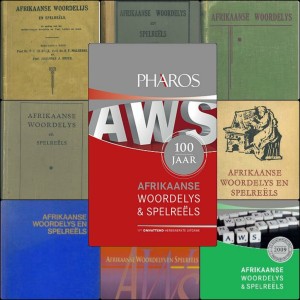The 11th, comprehensively updated edition of the Afrikaanse Woordelys en Spelreëls (AWS), a title that means ‘Afrikaans word list and spelling rules’, was released early in August this year.
The AWS is a remarkable publication in that it serves as the ultimate lodestar for the Afrikaans-speaking community regarding the writing and spelling of Afrikaans. Another reason for its significance is that the first edition was published in 1917 – exactly a century ago – “to ensure that this language come into its own” (according to an inscription in the first edition, translated here from an early form of Afrikaans). Ever since, the Taalkommissie of the Suid-Afrikaanse Akademie vir Wetenskap en Kuns (the Language Commission of the South African Academy for Science and Art) has endeavoured to help establish Afrikaans as a written language by making available rules for consistent spelling and writing. The nine members of the current Taalkommissie, comprising academics and language practitioners, spent more than 700 hours in collaborative meetings to update the AWS since 2009 (the publication date of the 10th edition) – without any remuneration.
It is also important for the AWS to reflect the growing lexicon and idiom of Afrikaans, as well as the needs of the community who writes in Afrikaans. For this reason, the publication contains a word list that focuses on new words and words of which the written form might pose a particular challenge. The current list is 30 000 words strong and includes a remarkable range of new entries from Afrikaans varieties such as Cape Afrikaans and Orange River Afrikaans – among others, ‘antie’, ‘dhaltjie’, ‘gangster’ and ‘poenankies’ (meaning ‘cute’). Other new additions reflect recent social and technological advancements, such as ‘googleloer’ for ‘google’ as a verb, ‘hommeltuig’ for ‘drone’, ‘meem’ for ‘meme’, ‘antispioenware’ for ‘antispyware’, ‘warsender’ for ‘jamming device’, ‘skermgreep’ for ‘screen grab’ and ‘hidrobreking’ for ‘fracking’. ‘Selfie’ and ‘venue’ speak for themselves. Even ‘flop’ made it!
“Afrikaans is a dynamic language that develops continuously, and the most recent AWS is exciting and living proof of this fact,” said Prof Gerhard van Huyssteen, chair of the Taalkommissie.
The AWS is published by Pharos, an imprint of NB Publishers, and is also available online.

A collage of the different editions of the AWS, featuring the latest edition in the middle.



